- Names of 875 Nepalis were added to the report, which is yet to be made public
- Rs 1-5 million extorted from each person
- Distribution of fake refugee ID cards
- Two fake lists incorporated into the report commissioned by the Ministry of Home Affairs
Devendra Bhattarai |CIJ, Nepal
A gang tampered with the report by a government committee tasked with resolving issues related to Bhutanese refugees, and added names of non-refugee Nepalis to the list of refugees by scamming them of millions of rupees. The group reportedly defrauded 875 Nepali nationals out of millions of rupees by promising them resettlement in the United States with refugee status by putting their names under the new categories of “those who missed registration” and “those interested in rehabilitation in a third country.”
The government taskforce, led by Balkrishna Panthi with Ganesh Bahadur KC and Deepak Prasad Neupane as members, was set up in June 2019 to address the Bhutanese refugee issue. The committee’s report, which hasn’t been released to the public, was manipulated by a gang to add 875 Nepali citizens’ names through the addition of two new schedules. These gang members, who have connections to government mechanisms, reportedly collected Rs 1-5 million per person and even distributed fake refugee identity cards.
Sanu Bhandari and Tek Gurung have been arrested by the Kathmandu Valley Crime Investigation Office along with Keshav Dulal, the gang leader who provided fake refugee identity cards to Nepali citizens. According to a victim from Urlabari, Keshav Dulal collected over 1 million rupees to prepare refugee identity cards and travel documents from more than 50 people to be sent to the US. Former ward chair Sagar Rai allegedly helped coordinate raising the funds, but he was reluctant to speak about it saying, “I have also heard rumours circulating. I will speak about it where and when it is necessary,” he added.
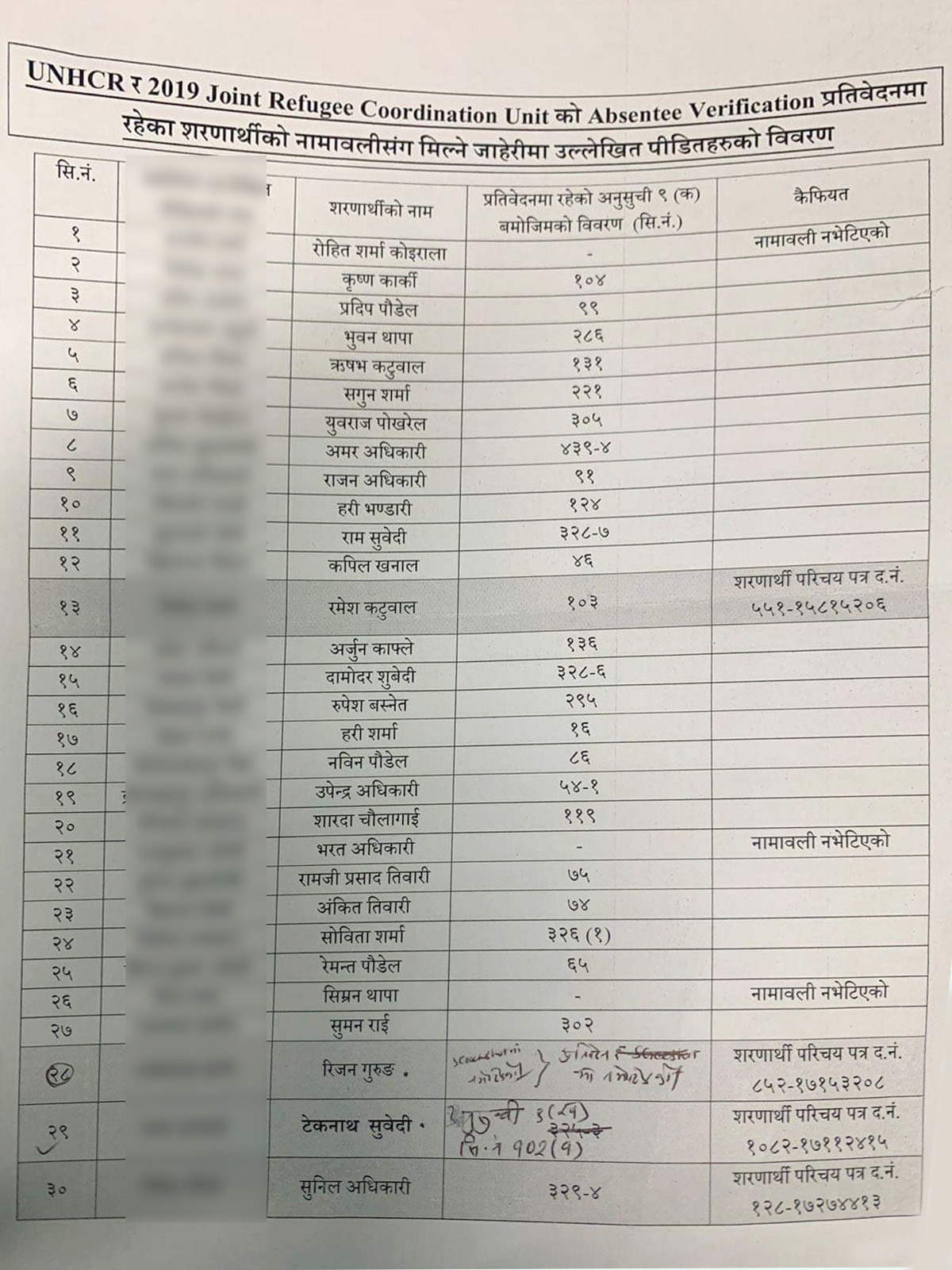
The gang altered the report by inserting schedules 9(a) and 9(b). Schedule 9(a) lists 535 names from 451 families who were charged money and have addresses outside of the refugee camps. The report says they were not included in the registration process for various reasons, but wanted to be resettled in a third country. Schedule 9(b) contains names of 340 individuals from 130 families who were also left out of the registration process for various reasons and have addresses inside the camps. They too seek resettlement in a third country, according to the report.
Latika Bhandari’s refugee ID card, issued by the Ministry of Home Affairs in December of last year, lists her address as ‘Beldangi-C3/ 339’. Similarly, Salina Pradhan’s ID card has ‘Beldangi 8-3/ 37 listed as her address. However, when this correspondent visited the Beldangi camp in Damak, it was found that there are no refugees with these names in the surrounding sectors. Kavita Rai, the representative of sector ‘B-3’, confirmed that the hut numbers listed on the ID cards don’t exist inside the camp.
The report’s list of those who missed registration includes the names of ‘Ramesh Katwal (Pathri-11 extension / F 2 / 107 / 1811 X)’ and ‘Sunil Adhikari (Pathri-11 extension / A 1 / 1708 X)’, but investigation has revealed that both individuals aren’t residents of the Pathri refugee camp. In fact, they are from Dang.
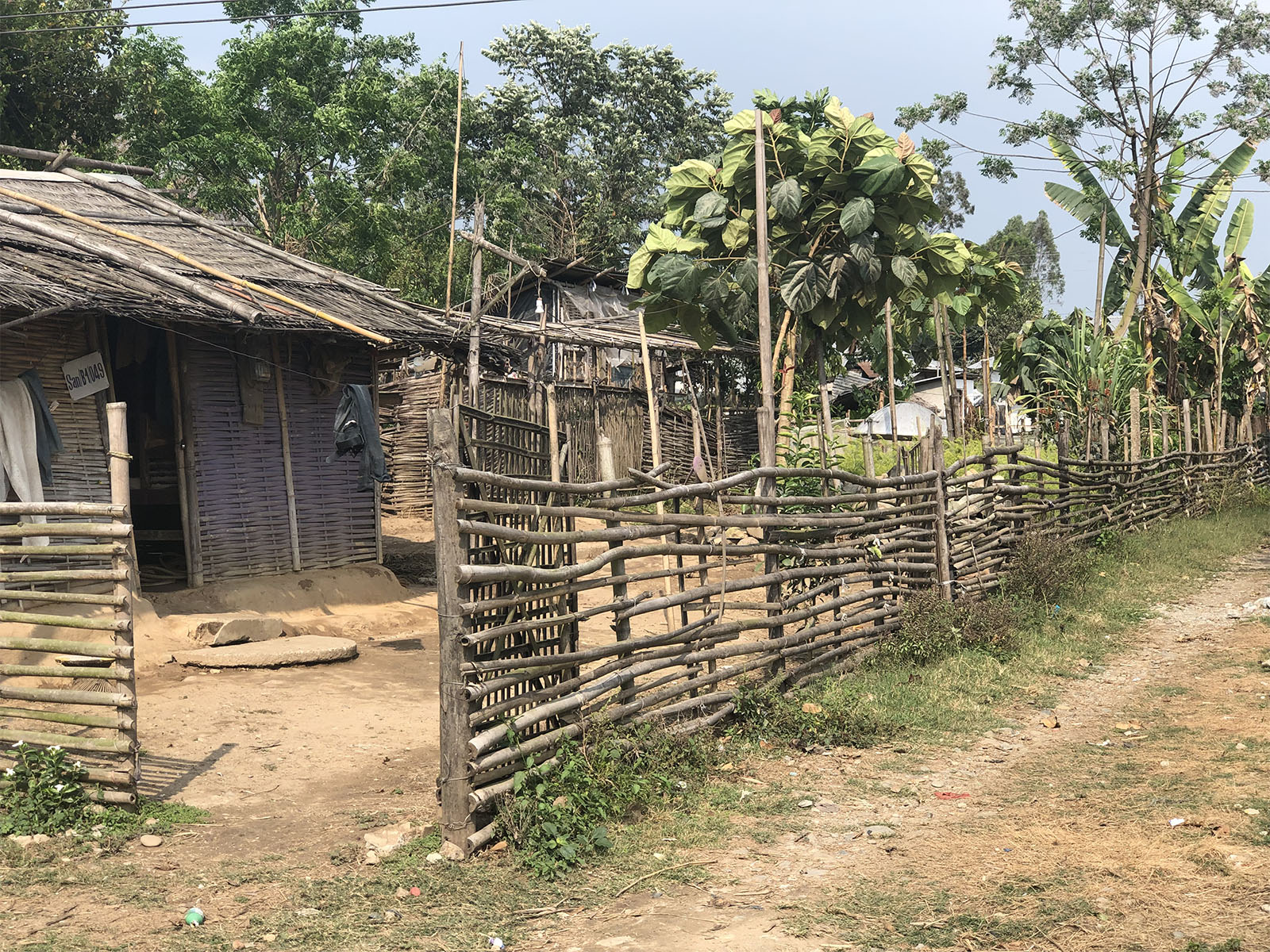
Pathari Refugee Camp. Photos: Devendra Bhattarai
The gang has been accused of scamming refugees out of 1 million rupees by falsely promising to facilitate their registration, take their pictures, conduct medical exams, and perform biometric scans. According to reports, the gang members also allegedly updated their Facebook statuses with pictures of supposed meetings with American embassy officials, using it as a pretext for demanding more money from the victims. A group of victims, including Ishwar Bhattarai, Sangeeta Khadka, Bikash Khadka, Sameer Parajuli, Sonia Limbu, Sara Tamang, Kamal Subedi, Mahesh Karki, Deepak Lamichhane, Krishna Bohora, and others, have come forward, claiming that they paid the gang money after selling their cultivable land. It is worth noting that all of the victims have different ‘refugee names’ and ‘citizenship names’.
Gajendra Budhathoki, a relative of a victim who hails from Dang, reported that a person named Sandesh Sharma allegedly collected money from acquaintances and villagers in the area. According to Budhathoki, the Valley Crime Investigation Office has received complaints from 61 victims in Dang. The gang began its operations in Dang in May 2021 and would sometimes take photos of victims at the Chitwan Safari Hotel or call them to Birat Medical in Biratnagar for health examinations. The victims were also called to Damak-Birtamode in Jhapa from Dang and with the promise of ‘travel documents (TD)’ or refugee IDs.
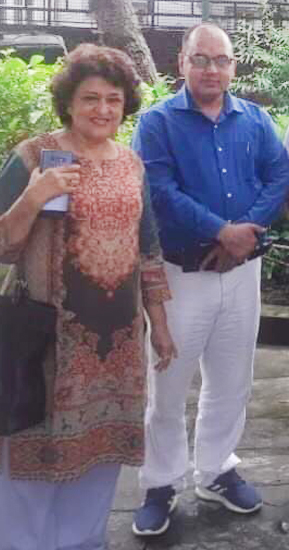 Budhathoki stated that he met the then Home Minister Balkrishna Khand and Home Secretary Teknarayan Pandey to report the gang’s operations. He mentioned that Pandey offered reassurance by saying, “I know Sanu Bhandari, I will do something.” The victims alleged that officials, including former Home Minister Ram Bahadur Thapa and his advisor Indrajit Rai, are also aware of or involved in the gang’s activities.
Budhathoki stated that he met the then Home Minister Balkrishna Khand and Home Secretary Teknarayan Pandey to report the gang’s operations. He mentioned that Pandey offered reassurance by saying, “I know Sanu Bhandari, I will do something.” The victims alleged that officials, including former Home Minister Ram Bahadur Thapa and his advisor Indrajit Rai, are also aware of or involved in the gang’s activities.
According to sources, Keshav Dulal, the leader of the gang, previously worked as a personal assistant to Sujata Koirala when she held the position of Deputy Prime Minister. It has been reported that when the victims, who were promised a chance to fly to America as refugees, arrived in Kathmandu with complaints, Dulal took them to meet with Koirala over a cup of tea. The victims claim that the gang manipulated them by leveraging their connections with high-level officials in the Ministry of Home Affairs.
In April last year, Bhutanese rights leader Teknath Rijal informed top leaders of various political parties about the gang involved in fraudulently taking money from people in the name of refugees, along with evidence. However, no action was taken to investigate the issue.
According to the victims, a gang involved in fraudulent activities made statements implying their close connections with government officials. “The gang claimed that the then Home Secretary, Premkumar Rai, was going to be the new chief commissioner of the Commission for Investigation of Abuse of Authority (CIAA), which hinted at a possible collusion between the two parties. The Jhapa Chief District Officer, Janak Dahal, will be transferred, and a joint verification process will be launched in the lower camps. The gang also stated that a task force would be formed to register refugees left out during previous registration, and it would be led by Home Ministry Joint Secretary Panthi,” a victim we met in Pathari said. “The gang’s statements came true, leaving us with no other option but to believe their claims.”
Victims from various regions including Dang, Kaski, Chitwan, Salyan, and others submitted evidence to the police against the gang. The victims include Rohit Sharma Koirala (also known as Santosh Sharma), Krishna Karki (Vivek Thapa), Pradeep Paudel (Pradeep Aryal), Bhuvan Thapa (Sandeshjung Thakuri), Kapil Khanal (Khimraj Paudel), Simran Thapa (Meena Rana), Ramji Prasad Tiwari (Bhupendra Budhathoki), and Sharda Chaulagai (Tenjina Lamsal). The evidence provided includes bank deposit receipts, fake refugee identity cards, and details of the amounts paid. The complaint against the gang, including Keshav Dulal, alleges that they defrauded over 200 people by offering them the false promise of a better life in the US.
Questionable role of the home ministry
The Ministry of Home Affairs has been taking steps to address the issue of refugees in eastern Nepal, with nearly 150,000 having left the camps to live in third countries. In order to find a sustainable solution, the ministry formed various working groups, committees, and study teams. In June 2019, a sub-committee was formed under the leadership of the chief district officer of Jhapa, following questions about the work of a previous working group led by former joint secretary Panthi, which was formed on December 5, 2021. The ministry gave an ambiguous mandate to to “give identity cards to the children of refugee identity card holders.”
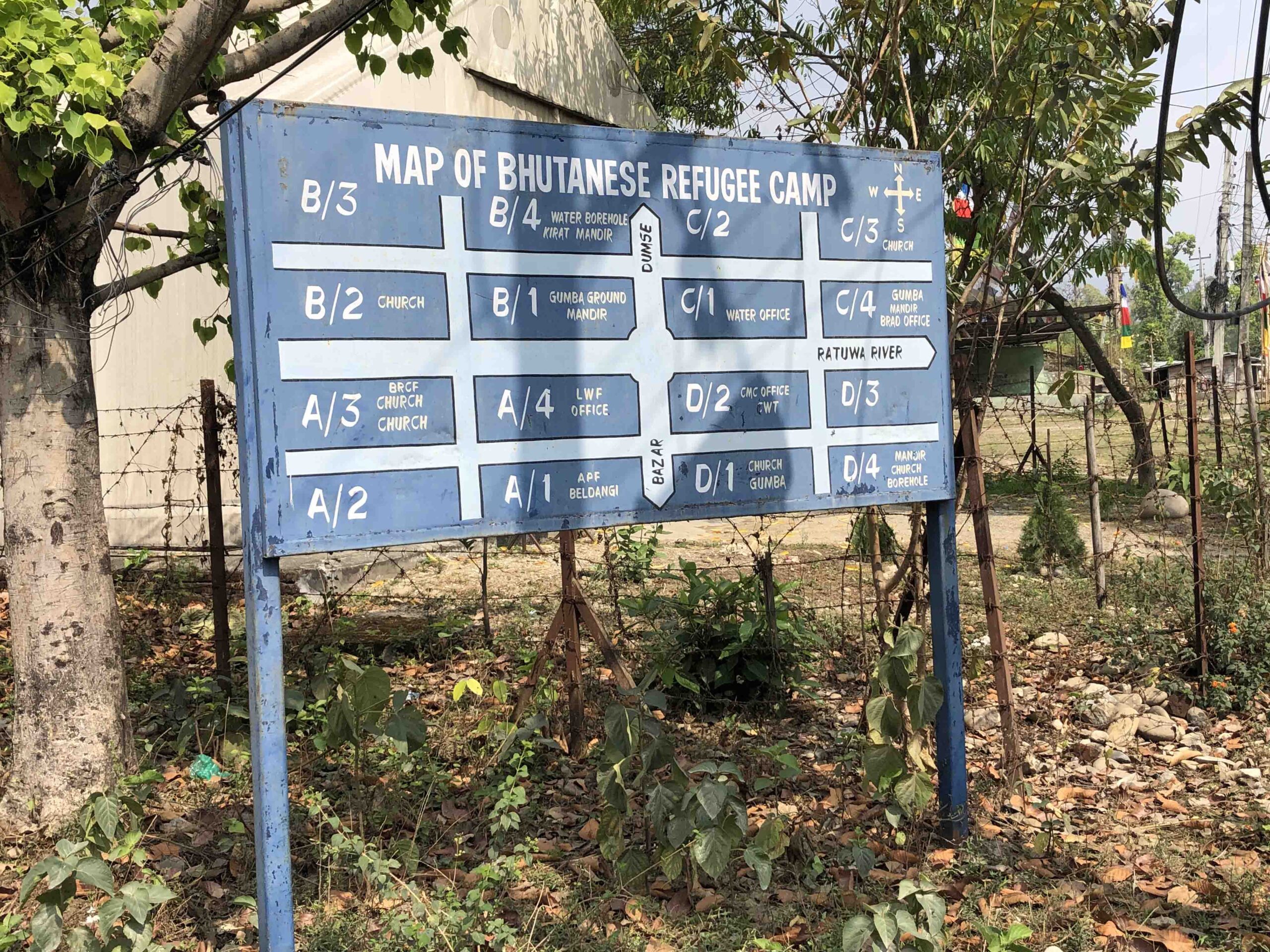
Residential List of Beldangi Refugee Camp.
On June 10, 2022, the Ministry of Home Affairs formed a new sub-committee to study the report submitted by the previous Panthi taskforce and provide suggestions for long-term solutions and management for exempted refugees. The sub-committee is still conducting its work. The head of this new sub-committee, Rudraprasad Neupane, assistant chief district officer, Jhapa, reported that they are currently verifying the names of 429 individuals who were listed as those who missed registration in the Panthi report. Neupane explained to Kantipur that the refugees are being studied in three categories: refugees, non-refugees, and those who are doubtful.
Questions have been raised about gang activities in the National Assembly under the direction of UML President KP Sharma Oli, after victims from Jhapa-Morang spoke to him. Chitwan’s National Assembly MP Dilkumari Thapa Rawal (Parbati) raised concerns that a gang is manipulating ordinary Nepalis economically to take them to America and called for a serious investigation. UML leader Yubraj Baskota acknowledged that many top leaders from UML, Congress, and Maoists are aware of the gang’s activities. “But due to their political and other reach, many are unable to speak out.”
What is in the report ?
A report from the Panthi taskforce was obtained by CIJ from home ministry sources, revealing that the task force was given six mandates. The sixth mandate, which is the most critical, yet ambiguous, stated that the taskforce shall recommend what the government needs to do with refugees registered but not resettled, as well as those left out of the registration process, could be returned to Bhutan or resettled in a third country. “However, the task force did not work on this mandate due to a lack of time and resources to track the exempted refugees,” said Panthi. “The taskforce completed its work without addressing this mandate, despite pressure to do so.”The report’s recommendations state, “The practice of repeatedly receiving applications for registration by refugees who have been left out from registration is exacerbating the problem. Therefore, it is necessary to eliminate not only the registration process but also the concept and existence of the camps. This is because Nepal lacks economic and natural resources and faces a challenging geopolitical situation that may have future consequences. Additionally, it is deemed inappropriate to provide Nepali citizenship to Bhutanese refugees.”
According to the Panthi report, there is a suggestion to create a scientific record of registered Bhutanese refugees by providing them with a ‘Smart Bhutanese Refugee Identity Card’. The report recommends that once the card is issued, the refugee camp should be vacated within a specific timeframe and the land should be handed over to the relevant government agency for protection under the current law.
The Panthi report recommends eight points, which include:
- a) Providing identity cards that keep a separate record of birth registration for the descendants of registered Bhutanese refugees.
- b) Granting facilities to obtain a driver’s license.
- c) Providing facilities for banking transactions.
- d) Providing facilities to open organisations related to refugee welfare.
- e) Facilitating business operations.
- f) Offering facilities for land-lease and building contracts.
- g) Granting travel permits for foreign travel.
- h) Providing facilities for basic necessities such as electricity, water, education, health, and communication.
‒ Full text of the report available at CIJ
– List of Schedules 9(a) and 9(b) added to the report
In December 2016, the sub-branch of the United Nations High Commission for Refugees in Damak, Jhapa, was closed following the completion of the resettlement program for Bhutanese refugees from Nepal. However, on April 16, 2022, the UNHCR office in Nepal released a statement announcing the suspension of all resettlement procedures for certified refugees amid reports of gangs extorting money from Bhutanese refugees in exchange for taking them to third countries. Despite the suspension, the gang reportedly continued to operate.
We haven’t recommended fresh registration: Coordinator Panthi
The report submitted to the ministry by the ‘Working Group to find permanent and long-term solutions to the problem of Bhutanese refugees’, which was led by former joint secretary of the Ministry of Home Affairs, Balkrishna Panthi, has not been released to the public. However, Kantipur has obtained a copy of the report from a confidential source, which includes 18 pages of recommendations to address the refugee problem. The report also includes details on the joint certification process, the number of refugees in the camp, and a list of individuals who were left out of registration, provided by the United Nations High Commissioner for Refugees (UNHCR) and the Refugee Coordination Committee (RCU). Nevertheless, the accuracy of the list of 429 people allegedly left out of registration is being disputed, and the report’s intentions are being questioned. When approached for comment, retired coordinator Panthi expressed surprise and denied giving any new registration recommendations:
The report of the working group you led is being dragged into controversy without it being made public. Isn’t it ?
Rumors about the report being discussed without being made public are baseless. The taskforce, formed following a minister-level decision in June 2019, comprised expert member Ganesh Bahadur KC and Ministry section officer Deepak Prasad Neupane. The task force commenced work on July 18 and prepared the report within three months. During this process, we consulted with the then-chief district officer of Jhapa, Janakraj Dahal, and the UNHCR representative. As part of our work, we received a list of 429 individuals left out of the registration process provided by UNHCR. We discovered that the RCU and UNHCR, in coordination with the Government of Nepal, had already gathered the necessary evidence related to the names. We put this same list in the report. It is not the subject of our further scrutiny or investigation. Therefore, it is not appropriate to link this report to the controversy surrounding the registration issue.
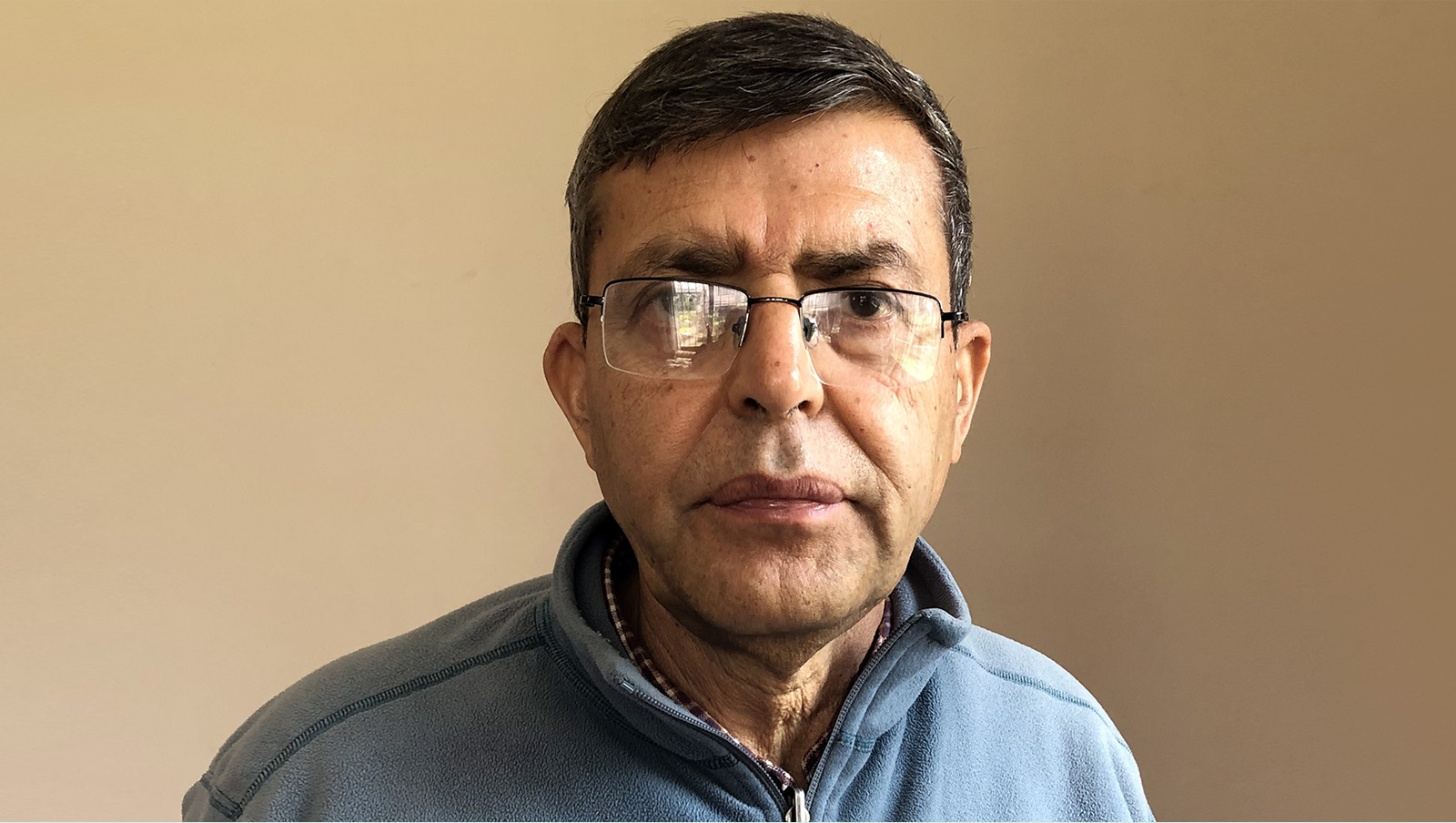
As coordinator of the taskforce, are you aware that many names have been added to the report as part of a scam promising non-refugees a life in the US?
I am unaware of any tampering or alteration to the report submitted by our group. My team submitted an 18-page report along with 10 schedule records to the relevant authorities, outlining our recommendations for the management of the nearly 6,500 Bhutanese refugees recognised in Nepal. As part of our study, we reviewed the list of exempted refugees, which had been a subject of concern and request from individuals, refugee camps, and other agencies involved in supporting the refugees. However, we did not see the need to create a new list of exempted refugees as it is not easy to determine someone’s true identity solely based on their claims or statements. The Bhutanese government also has a role to play in verifying the status of refugees. While there may be genuine Bhutanese refugees left out of the registration process, it is not appropriate to make a determination without proper evidence and verification.
In the mandate given to your taskforce, it is also said to ‘prepare a list of refugees who have been registered but are yet to be resettled and also those who were left out of the registration process’. What do you say about this ?
As stated in my previous response, while we did review the list of exempted refugees during our study, we did not create a new list as part of our recommendations. The last point of our mandate did mention the preparation of a list of exemptions from registration, and we did receive applications from individuals with such claims. However, due to the lack of evidence and time, we could not verify these claims unilaterally. Therefore, we did not undertake the task mentioned in the last point of our mandate.
‘Gangs cashed in on confusion,’
The working group’s report suggested potential solutions for the refugee problem at the time of its submission. However, it is ultimately the responsibility of the central government to determine how to proceed with the 429 individuals who have requested registration or those seeking asylum in foreign countries. Our role is simply to implement the government’s directives and decisions. The report is only a preliminary input, and the government is responsible for producing the final output and taking necessary actions. I have not personally reviewed the entire Panthi working group’s report, but it is important to note that any inclusion of new refugees in the report’s list beyond the mandate given would be incorrect.
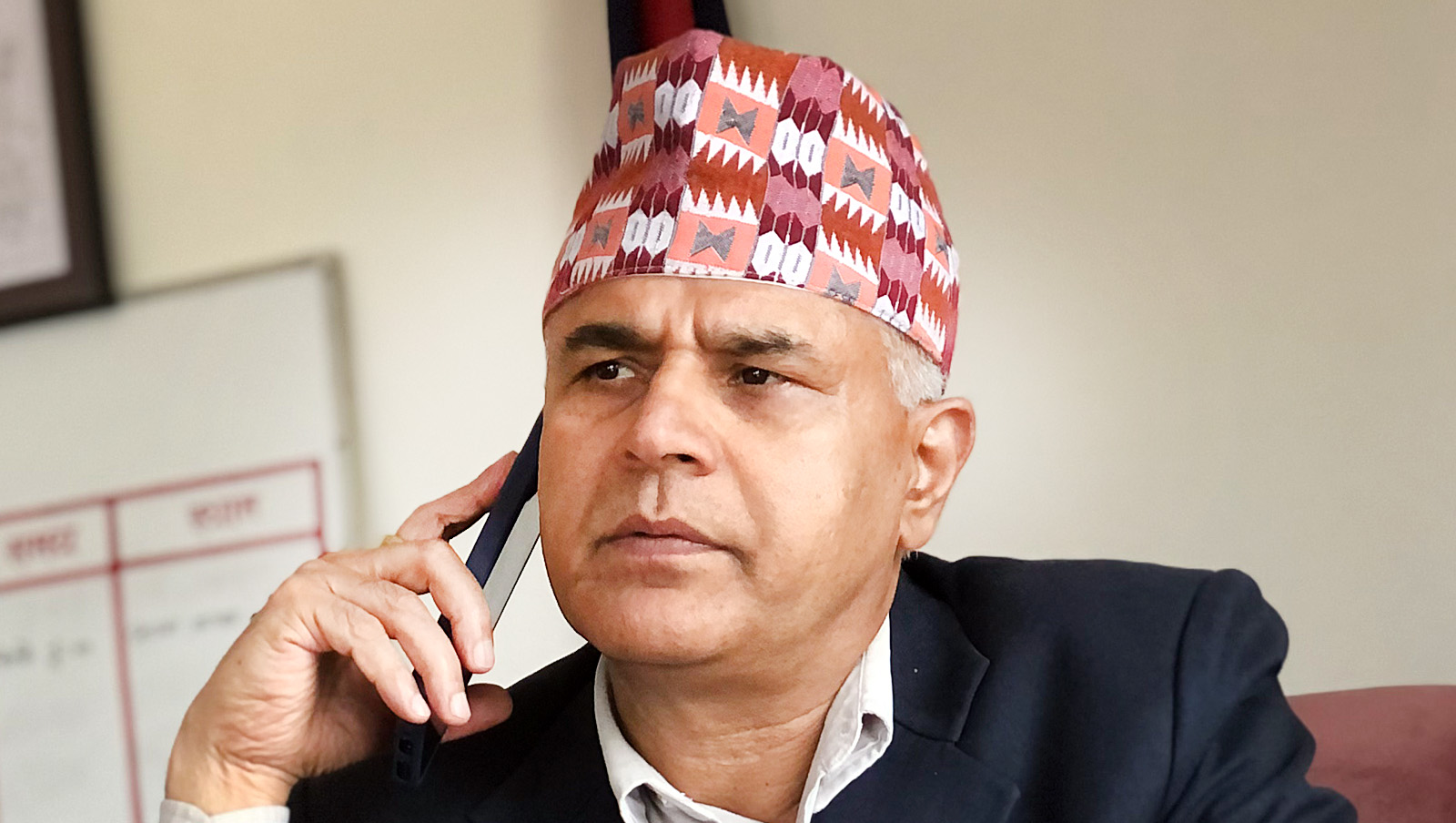
Shivaram Pokharel, Chief District Officer, Jhapa
It is not possible to issue an identity card for refugees without proper verification and a ministerial decision. We have come across some cases where suspicious identity cards were presented for verification, and upon investigation, we found that the address, hut number, and even the officer’s signature were fake. It is essential to conduct proper verification to avoid any confusion in the refugee problem. Such confusion may even provide an opportunity for criminal elements to take advantage of the situation.
I am concerned about the increasing trend of what I call ‘foreign-mania’. Many seem to have the illusion that they can easily migrate to countries like the United States by hook or by crook. This is nothing but a form of human trafficking, and we need to take it seriously. We cannot keep carrying the burden of refugees indefinitely. There are other possibilities to explore, such as voluntary repatriation to their home country or resettlement in a third country. The government will closely monitor the situation and take necessary actions.
‘We have been investigating for 10 months’
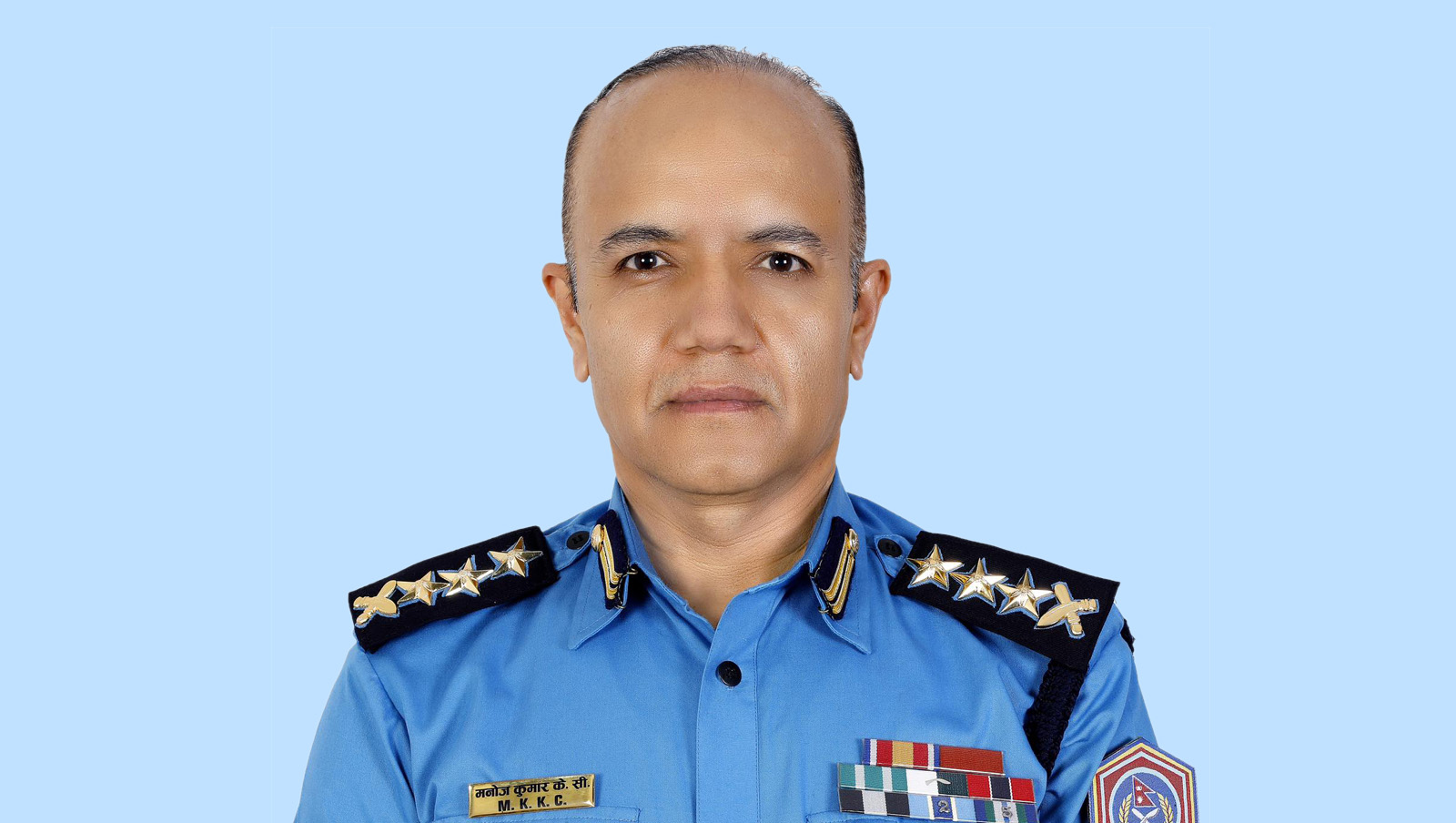
Manoj Kumar KC, Senior Superintendent of Police, Kathmandu Valley Crime, Investigation Office
Based on the complaints received and the evidence gathered, we have detained three individuals today. This investigation has been ongoing for the past 10 months, and initial findings suggest that these individuals cheated vulnerable individuals with the promise of taking them to America. We are conducting a thorough investigation, and anyone found involved in this scheme will be brought to justice. The Kathmandu District Court has granted us a five-day extension to continue our investigation with those arrested today.



